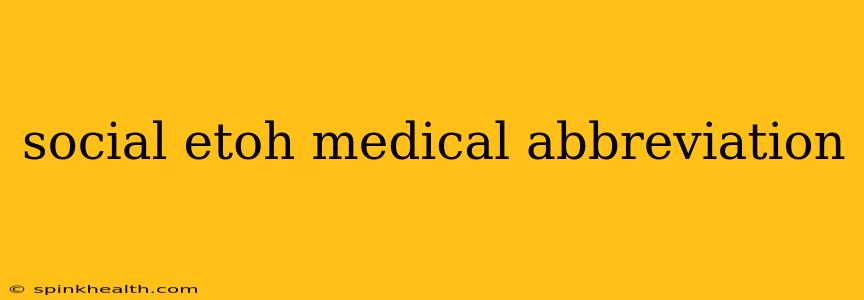Social ETOH: Understanding the Medical Abbreviation and Its Implications
The medical abbreviation "social ETOH" is a common shorthand used in healthcare settings to describe a patient's alcohol consumption. It stands for social ethanol, with ethanol being the type of alcohol found in alcoholic beverages. But what does "social" really mean in this context, and why is this seemingly simple abbreviation so important? Let's unravel the meaning and explore its significance in patient care.
My name is Dr. Anya Sharma, and I've spent over a decade working in addiction medicine. I've seen firsthand the crucial role accurate medical documentation, like the use of "social ETOH," plays in providing effective and compassionate patient care.
What does "Social ETOH" actually mean?
The term "social ETOH" implies that a patient consumes alcohol in a way that is generally considered socially acceptable. This doesn't mean moderate drinking in the strictest sense, but rather that the alcohol use isn't overtly problematic or causing significant impairment to the individual's life. It suggests that the patient drinks alcohol occasionally, typically in social settings, and doesn't experience significant withdrawal symptoms or engage in risky behaviors related to their drinking.
It's crucial to remember that "social" is a relative term. What constitutes "social drinking" varies widely depending on cultural norms, individual tolerance, and other factors. What might be considered "social" for one person could be considered problematic for another.
Is Social ETOH the same as moderate drinking?
While often used interchangeably, social ETOH and moderate drinking aren't precisely the same. Moderate drinking typically refers to specific guidelines on the quantity and frequency of alcohol consumption, usually defined by organizations like the CDC and WHO. These guidelines generally suggest limits to minimize health risks. Social ETOH, on the other hand, is a more subjective assessment based on a clinician's judgment of the patient's drinking patterns and their impact on their life. A patient might be described as a "social drinker" but still exceed the guidelines for moderate drinking.
What are the potential risks associated with social ETOH?
Even "social" alcohol consumption carries potential risks. These risks aren't necessarily immediate or dramatic, but they accumulate over time. Long-term, even seemingly moderate drinking can contribute to:
- Increased risk of certain cancers: Several studies link alcohol consumption, even at moderate levels, to an increased risk of various cancers, including liver, breast, and colorectal cancers.
- Liver damage: Chronic alcohol consumption, even if "social," can gradually damage the liver, leading to conditions like fatty liver disease and cirrhosis.
- Cardiovascular problems: While some studies suggest moderate alcohol consumption might offer minor cardiovascular benefits, excessive drinking can negate these advantages and increase the risk of heart disease and stroke.
- Mental health issues: Alcohol can exacerbate existing mental health conditions like depression and anxiety and can contribute to the development of new ones.
- Increased risk of accidents and injuries: Impairment from alcohol, even after seemingly "social" drinking, can increase the likelihood of accidents, injuries, and risky behaviors.
How is Social ETOH documented in medical records?
The specific way "social ETOH" is documented can vary among healthcare providers. It might be a simple note in the patient's history, or it might be part of a more comprehensive assessment of the patient's alcohol use. Often, further questions and assessments are undertaken to better characterize the patient's alcohol use. This could involve using standardized questionnaires to quantify alcohol use.
Why is accurate assessment of alcohol use important?
Accurate documentation of alcohol use, including characterizing it as "social ETOH," is crucial for several reasons:
- Informed treatment: Understanding a patient's alcohol consumption habits allows healthcare providers to tailor treatment plans effectively.
- Risk stratification: It helps identify individuals at risk of alcohol-related problems, enabling early intervention.
- Monitoring changes: Tracking alcohol consumption over time can help assess the effectiveness of interventions and identify potential issues.
- Legal and ethical considerations: Accurate documentation is essential for compliance with regulations and ethical guidelines.
In conclusion, while "social ETOH" appears simple, it represents a nuanced aspect of patient care. It's a shorthand for a more complex evaluation that requires careful consideration of individual circumstances and potential health risks. It's a crucial element in understanding a patient's overall health picture and providing appropriate care. Remember, if you have concerns about your own alcohol consumption, consult a healthcare professional for personalized advice.

